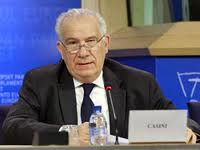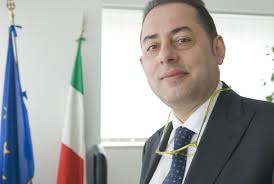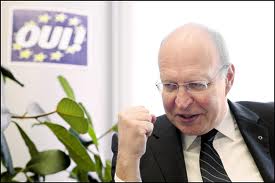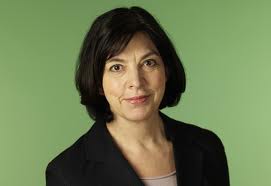For Carlo Casini we must strive to unify Barroso e van Rompuy’s position. Pittella: our candidate is Schulz. Duff: This will electrify the election campaign. Harms: A first step. Angelilli: I would like that
Carlo Casini is an old political animal; he has seen a lot of action – he’s been in Parliament (Italian then European and Italian, then again Italian and now European again) since 1979. In this legislature (elected in the Union of  Christian and Centre Democrats, Udc) he is President of the Committee for Constitutional Affairs, that once was the one of Giorgio Napolitano. If he says that “there isn’t a treaty nor regulation that would prevent the President of the European Commission and that of the European Council from being the same person”, beyond affirming a truth, he also expresses a political program. That can be done and be done with the basic political willpower to do so without complicated modifications to European treaties and without making Parliament and citizens vote again.
Christian and Centre Democrats, Udc) he is President of the Committee for Constitutional Affairs, that once was the one of Giorgio Napolitano. If he says that “there isn’t a treaty nor regulation that would prevent the President of the European Commission and that of the European Council from being the same person”, beyond affirming a truth, he also expresses a political program. That can be done and be done with the basic political willpower to do so without complicated modifications to European treaties and without making Parliament and citizens vote again.

We must get there gradually and the first step has already been taken: the direct election of the Commission’s President next year, taking advantage of the renewal of Parliament in the spring and of the Commission in the fall. It is about starting a real revolution because the goal of this project is to change an important power holder in the EU, moving the choice from the governments directly into the hands of the people.
The President of the Commission is the “guardian of the treaties;” he is the driving agent and then the coordinator for enacting European policy, the one who has the power to initiate legislature. Deprive the governments of the power to choose and put it, not even in Parliament, but directly in the hands the citizens is truly revolutionary.
Like this the EU would seem less like a supranational organism and more like a government run directly by its constituents.
A double institutional passage is approaching (Parliament elections between May 22nd and 25th and a new Commission) which will however be a real hassle for Italy, because they will have the Presidency turn of the EU in that fateful 2nd semester of 2014. The Lisbon treaty, the one on which the Union’s actual structure is based, foresees that Parliament approves the proposal of President of the Commission made by the Council, and without a favorable vote by MEPs no president will be nominated and no Commissioner can take office. The Parliament decided to overturn this order with a political act, imposing on the Council – that is to say on the governments – a choice made by the constituents and then sanctioned by the MEPs. It is a choice sanctioned by a resolution (developed by Casini’s Commission) approved with a huge majority on November 22, 2012, passed however almost in silence. Parliament, the text says, “urges European political parties to nominate candidates for the Presidency of the Commission and expects those candidates to conduct a guiding role in the Parliamentary election campaign atmosphere, in particular, personally presenting their program in all the member states of the Union”. The text, simple and explicit, then outlines “the importance of strengthening legitimate policy both of the Parliament and of the Commission establishing a more direct link between the respective elections and the choice of voters”. On the same line also the European executive. Last March Viviane Reding, the Commissioner for Justice, after the MEP’s willpower was clear, presented a recommendation to Parliament that goes like this: “The political parties – maintains the Luxembourger in the name of the entire Electoral College – must make it known which candidates they support”. Even Josè Manuel Barroso had supported this position.
“At last we will have a European campaign, with a real European political agenda and not national or local issues. It would finally be a real politicization of the Union”, hopes Gianni Pittella, Democratic Party, first VP of the European Parliament (that is the most voted for among the 14 there are). Pier Luigi Bersani, former Secretary of his party thinks about it the same way: “The challenge for the entire leftist area is to win…..in the European elections in 2014 where the left wings must be present with a single platform and a single candidate for the Presidency of the European Commission”, Bersani said after a meeting with the President of the European Parliament, Martin Schulz in Rome on November 8, 2012. An affirmation that sanctioned also that the German politician “is the best candidate”. The party line, with Guglielmo Epifani, should not change. If Pittella should become Secretary of Pd in October, since he has officially nominated himself, then the question becomes even clearer. Hannes Swoboda, Austrian President of the Alliance Socialists and Democrats group in the Parliament, can only agree: “obviously I support Schulz but there is not a formal decision yet”, he says, highlighting the key importance of this decision: “It will be a double election campaign, for the Parliament and the Commission. It is a way to give more power to the people. It is a new concept of Europe with a candidate who has a dimension, a story, a European role; it is no longer a former premier who comes from his country and few people know him”. The other Italian Vice President is Roberta Angelilli, People’s Party. “I would like for the people to be able to elect the President of the Commission as well – she says – 80% of the national legislation depends on The European Parliament and Commission”.
Casini, distinguished representative for the People’s Party, the main political family in the European Parliament, is on the same page. He threw himself out like a dead body on this choice with a discussion held in October 2012

in Cyprus, starting from the ideal basis that “Europe belongs to the people. With a ‘direct’ election of the President of the Commission I know who to vote for and contribute to choosing who will lead”. It would really lead Europe to the countries, “during the election campaigns for European Parliament one will be compelled to talk about the EU”, insists Casini. The People’s Party however doesn’t have a candidate yet, as Mario Mauro, another distinguished representative of the group, confirmed just before leaving Strasbourg to become Minister of Defense. For years Mauro was Head of The People of Freedom group before joining Mario Monti; “there are no names yet,” he says. However others have made nominations and the most recurring are those of a European Commissioner in office, the French Michel Barnier, chosen by Nicolas Sarkozy to manage the single market, then there is a Prime Minister, the Polish Donald Tusk; but there is also Herman van Rompuy, whose current mandate of President of European Council will expire in 2 years and he’s ready to cross to the other side of the road to rue de la Loi, the street in Brussels where on the North side there is the Commission and on the South side his office. Casini has his own idea: diplomatically confirmed, his “great esteem” for the People’s Josè Manuel Barroso, and pays tribute to the leader of his alliance Mario Monti “has extraordinary qualities and benefits from huge respect”, reveals that his candidate is the British Labourist Tony Blair. The former Prime Minister “is a moderate, then we have the problem of the UK.I think it would be a good name”. The compromise – because Casini knows, as everybody knows, that the name must be the fruit of a compromise in Parliament.
The Socialists have their candidate; the People’s Party, in spite of Barroso’s self-nomination, are still looking for one and “we too will choose our candidate as soon as possible, certainly by 2013,” explains the President of the European Greens, Monica Frassoni. She would prefer a Green candidate but “we also aim to find an alignment with other leftist parties, and if then we find an exchange on a single candidate we can also withdraw ours. Certainly, if on the other hand the candidate carried a Green name we would be even happier, obviously”. If everyone started, already from the beginning with a single candidate it would be done.

One of the creators of the motion is the British Liberal Andrew Duff: “We will insist that the candidate campaigns during the elections and becomes a Member of Parliament”, he explains, claiming that the resolution in November was sustained by the Spinelli Group, presided by him and which Mario Monti is a member among others. “I strongly believe that the connection between the Presidency of the Commission and the election campaign will electrify this last thing and furnish an element of citizens’ choice for the first time between personality, parties and programs in competition. It will be a media face-off and the European dimension of the difficult choices that the EU will confront will really be in front of everybody for the first time”. The Council, claims Duff “doesn’t have a choice, it is the Parliament that decided who does or doesn’t become President of the Commission”. And nobody, he murmurs at the end, “will be elected without the support of a majority across the board”. The liberals don’t have an official candidate yet but Duff’s “personal” choice probably fits with the one of most parties (and also outside): Guy Verhofstadt, Prime Minister of Belgium for nine years, declared Europeanist and now revered President of the Liberal European Parliament.
“The personalization of the election campaign is the first step, what is needed is a real European program,” says Rebecca Harms, Co-President of the Green Group. “The constituency must understand – she claims – that the majority of the parties are pro-Europe, this is true but this doesn’t mean that they agree on everything; there are diverse possible choices”. The German is however less relaxed than the British on the position of the European Council, “certainly – she says – it will be more difficult for heads of state and government to do what they want regardless of the role of Parliament, but this choice also relies on balance within the states”. The governments could put pressure on their national MEPs, as happens often, and this could destroy the direct choice made by the people.

The recommendation of the candidate for President of the Commission would only have political value, strong but not binding. And the parties must, once they have seen the election results, be consistent and come together for the winning candidate, the one of the coalition that got the most votes; otherwise, if they went back to mediate between MEPs, there would no longer be a direct choice.
Lorenzo Robustelli


![Una donna controlla le informazioni sul cibo specificate sulla confezione [foto: archivio]](https://www.eunews.it/wp-content/uploads/2014/12/Etichette-alimentari.jpg)


![Ragazza in biblioteca. Nell'Ue chi studia non lavora e neppure cerca. In Italia funziona ancor più così [foto: Tulane University, Wikimedia Commons]](https://www.eunews.it/wp-content/uploads/2024/11/Girl_in_the_Library_3638661587-350x250.jpg)



